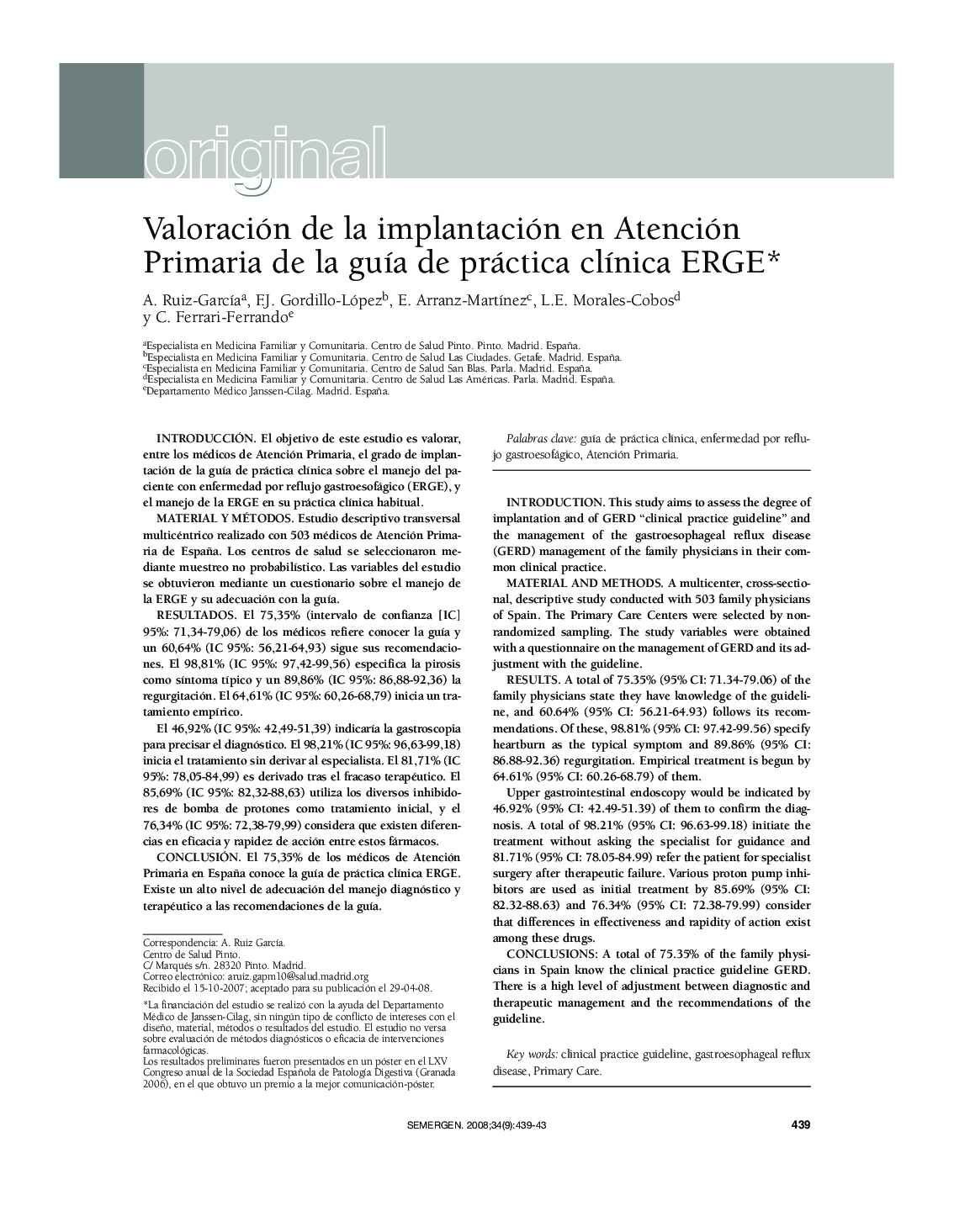| Article ID | Journal | Published Year | Pages | File Type |
|---|---|---|---|---|
| 3835572 | SEMERGEN - Medicina de Familia | 2008 | 5 Pages |
IntroducciónEl objetivo de este estudio es valorar, entre los médicos de Atención Primaria, el grado de implantación de la guía de práctica clínica sobre el manejo del paciente con enfermedad por reflujo gastroesofágico (ERGE), y el manejo de la ERGE en su práctica clínica habitual.Material y métodosEstudio descriptivo transversal multicéntrico realizado con 503 médicos de Atención Primaria de España. Los centros de salud se seleccionaron mediante muestreo no probabilístico. Las variables del estudio se obtuvieron mediante un cuestionario sobre el manejo de la ERGE y su adecuación con la guía.ResultadosEl 75,35% (intervalo de confianza [IC] 95%: 71,34-79,06) de los médicos refiere conocer la guía y un 60,64% (IC 95%: 56,21-64,93) sigue sus recomendaciones. El 98,81% (IC 95%: 97,42-99,56) especifica la pirosis como síntoma típico y un 89,86% (IC 95%: 86,88-92,36) la regurgitación. El 64,61% (IC 95%: 60,26-68,79) inicia un tratamiento empírico.El 46,92% (IC 95%: 42,49-51,39) indicaría la gastroscopia para precisar el diagnóstico. El 98,21% (IC 95%: 96,63-99,18) inicia el tratamiento sin derivar al especialista. El 81,71% (IC 95%: 78,05-84,99) es derivado tras el fracaso terapéutico. El 85,69% (IC 95%: 82,32-88,63) utiliza los diversos inhibidores de bomba de protones como tratamiento inicial, y el 76,34% (IC 95%: 72,38-79,99) considera que existen diferencias en eficacia y rapidez de acción entre estos fármacos.ConclusiónEl 75,35% de los médicos de Atención Primaria en España conoce la guía de práctica clínica ERGE. Existe un alto nivel de adecuación del manejo diagnóstico y terapéutico a las recomendaciones de la guía.
IntroductionThis study aims to assess the degree of implantation and of GERD “clinical practice guideline” and the management of the gastroesophageal reflux disease (GERD) management of the family physicians in their common clinical practice.Material And MethodsA multicenter, cross-sectional, descriptive study conducted with 503 family physicians of Spain. The Primary Care Centers were selected by non-randomized sampling. The study variables were obtained with a questionnaire on the management of GERD and its adjustment with the guideline.ResultsA total of 75.35% (95% CI: 71.34-79.06) of the family physicians state they have knowledge of the guideline, and 60.64% (95% CI: 56.21-64.93) follows its recommendations. Of these, 98.81% (95% CI: 97.42-99.56) specify heartburn as the typical symptom and 89.86% (95% CI: 86.88-92.36) regurgitation. Empirical treatment is begun by 64.61% (95% CI: 60.26-68.79) of them.Upper gastrointestinal endoscopy would be indicated by 46.92% (95% CI: 42.49-51.39) of them to confirm the diagnosis. A total of 98.21% (95% CI: 96.63-99.18) initiate the treatment without asking the specialist for guidance and 81.71% (95% CI: 78.05-84.99) refer the patient for specialist surgery after therapeutic failure. Various proton pump inhibitors are used as initial treatment by 85.69% (95% CI: 82.32-88.63) and 76.34% (95% CI: 72.38-79.99) consider that differences in effectiveness and rapidity of action exist among these drugs.ConclusionsA total of 75.35% of the family physicians in Spain know the clinical practice guideline GERD. There is a high level of adjustment between diagnostic and therapeutic management and the recommendations of the guideline.
